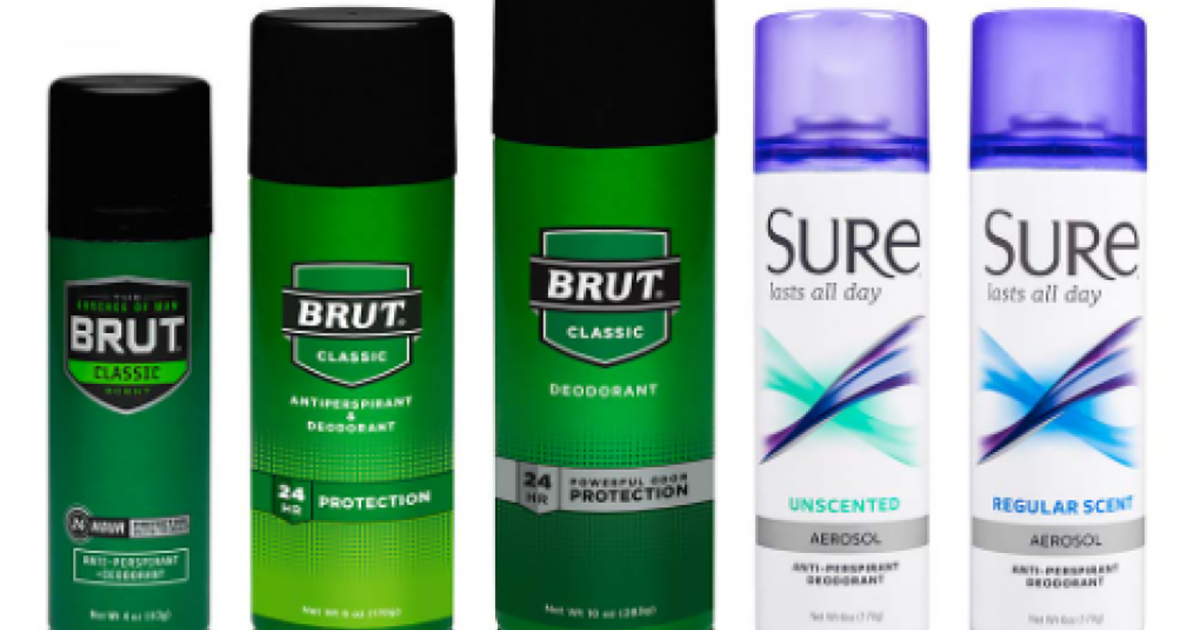Signs & Symptoms of Benzene Exposure
- Sure and Brut Aerosol Sprays have been recalled due to the presence of benzene, a potentially cancer-causing chemical.
- While benzene is not an ingredient in any of the recalled products, the FDA press release states, "our review showed that unexpected levels of benzene came from the propellant that sprays the product out of the can."
- Benzene is a highly flammable, colorless or light yellow liquid that can form naturally, or be produced by human activities, according to the CDC. This chemical is harmful to the eyes, skin, airway, nervous system and lungs, and can cause blood cancers like leukemia.
- While a growing body of medical research shows that chemicals in your environment can slightly increase your risk of cancer, it is unlikely that occasional exposure will do much harm, one SurvivorNet expert says.
Sure and Brut Aerosol Sprays have been recalled due to the potential presence of benzene.
Read More- Brut Classic Antiperspirant Aerosol (4 oz) – UPC 00827755070085
- Brut Classic Antiperspirant Aerosol (6 oz) – UPC 000827755070108
- Brut Classic Deodorant Aerosol (10.0 oz) – UPC 00827755070047
- Sure Regular Antiperspirant Aerosol (6.0 oz) – UPC 00883484002025
- Sure Unscented Antiperspirant Aerosol (6.0 oz) – UPC 00883484002278
TCP HOT Acquisition LLC HRB Brands has not issued a formal statement about the recall other than its press release posted to the FDA website.
However, a hotline has been set up for questions regarding the recall. Concerned customers can call 1-866-615-0976. The company has also set up a website for consumers to request a refund and find additional information, which can be found at www.brutsurerecall2022.com.
What is Benzene?
Benzene is a highly flammable, colorless or light yellow liquid that can form naturally, or be produced by human activities, according to the U.S. Centers for Disease Control and Prevention.
This chemical is harmful to the eyes, skin, airway, nervous system and lungs, according to the CDC, and can cause blood cancers like leukemia.
Do Benzene and Formaldehyde Cause Acute Myeloid Leukemia (AML)?
Benzene is sometimes released into the air through automobile emissions or the burning of coal or oil. It is also used in the manufacturing of some plastics, rubbers, dyes, detergents and drugs.
The chemical is a known carcinogen, meaning its link to cancer, particularly blood cancers, has been established. The FDA allows the chemical to be used in drug manufacturing only if the use is unavoidable and the drug product makes a "significant therapeutic advance." If the chemical must be used, benzene levels should be limited to 2 ppm (parts per million) "unless otherwise justified," according to FDA regulations.
Dr. Jay Shah, cancer care program leader for urologic oncology at the Stanford Cancer Center, previously told SurvivorNet that benzene levels only become an issue if an individual is frequently exposed to a product.
"While a growing body of medical research shows that chemicals in your environment can slightly increase your risk of getting cancer, it's unlikely that occasional exposure, like getting your nails or your hair done, will do much harm," Dr. Shah explained.
This becomes more of a concern with daily-use products such as shampoos, conditioners, face washes, lotions, serums, make-up, soaps or deodorants, like the Sure and Brut Aerosol Sprays.
Dr. Shah pointed out that data suggests individuals who frequently use a product containing a cancer-causing chemical do, in fact, have a greater risk of being diagnosed with the disease.
"Hairdressers who handle a lot of hair dyes are historically known to have a higher risk of developing bladder cancer," Dr. Shah gave as an example.
In addition to frequent use, genetics can also play a role in determining a person's risk factors. Dr. George Yaghmour, assistant professor of clinical medicine at the University of Southern California Keck School of Medicine, previously told SurvivorNet that products with benzene can be a "driving factor" that impacts those who are already at risk of developing cancer due to a genetic predisposition.
"We don't believe that there are factors that cause leukemia, but we believe that there are mutations accumulated from different environmental factors, on top of predisposing genes … that turn into leukemia," Dr. Yaghmour explained.
Signs & Symptoms of Exposure
People who breathe in high levels of benzene may develop the following signs and symptoms within minutes to several hours:
- Dizziness
- Drowsiness
- Rapid or irregular heartbeat
- Headaches
- Tremors
- Confusion
- Unconsciousness
- Death (at very high levels)
Eating foods or drinking beverages containing high levels of benzene can cause the following symptoms within minutes to several hours:
- Vomiting
- Irritation of the stomach
- Dizziness
- Sleepiness
- Convulsions
- Rapid or irregular heartbeat
- Death (at very high levels)
Contributing: Abby Seaberg
Learn more about SurvivorNet's rigorous medical review process.


